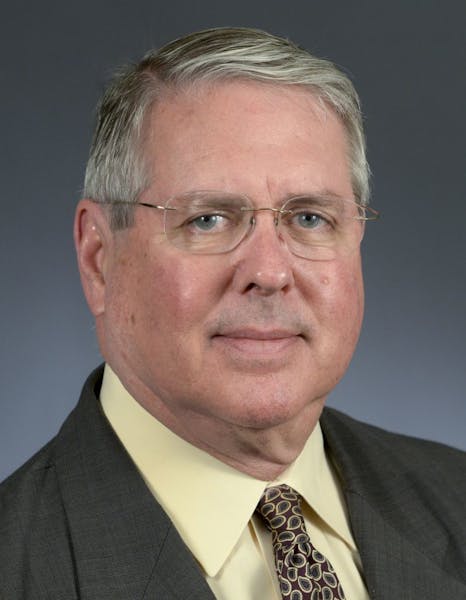When a handful of people describe something as normal that is, in fact, preposterous, it doesn't mean the subject in question is normal. Rather, it's still preposterous — unless no one rises to argue otherwise.
Such was the case Tuesday when Lessard-Sams Outdoor Heritage Council chair David Hartwell and a handful of like thinkers on the council delivered two finalists — two — out of 35 applicants for the job of the group's executive director.
The full council was informed on Monday that they were expected to name a new executive director from the two candidates, both hand-picked by Hartwell and a council subcommittee he selected.
Maybe that's normal. Maybe it's preposterous.
The job pays about $107,000 and is, or should be, one of the most important in state conservation: The council helps dole out $100 million annually in Legacy Act money to benefit game, fish and wildlife.
To that end, the executive director helps set the council's agenda, keeps the council informed about on-track conservation projects and those that fail to launch, and — especially — helps guide the council in its effort to conserve and protect as many natural resources as possible in the next 20 years that Legacy funding will be forthcoming.
Current executive director, Bill Becker, is retiring.
There's no telling how the vote for his replacement would have proceeded had the council been forced to select one of the two candidates. But a vote was never held because some council members balked at the process.
It has since been learned that two of the five finalists were well-known, experienced state conservationists.
One was Mark Johnson, executive director of the Minnesota Deer Hunters Association. The other was Mark Holsten, a former legislator who served with distinction in that capacity, and as Department of Natural Resources commissioner under Gov. Pawlenty.
Somehow we are expected to believe their résumés were deficient to those of the two chosen finalists: Heather Koop, assistant director and project analyst manager for the Lessard-Sams Council, and Kevin Bigalke, district administrator for the Nine Mile Creek Watershed District.
In charge of paring down the original field of applicants was the Legislative Coordinating Commission (LCC), a state bureaucracy whose responsibilities are vast and diffuse. It claims to be apolitical. But Bob Anderson, mayor of International Falls and a veteran of governmental commissions, including those charged with hiring key personnel, thinks otherwise.
Anderson is on the Lessard-Sams Council and was one of the five members Hartwell named to choose the final candidates.
"I told the LCC flat-out that they were political in their choosing of candidates," Anderson said.
Hartwell said Tuesday that formation of the council subcommittee was necessary because the full council is subject to the state's open meeting law, meaning its review of finalists would have to be done in public. The five-member panel, by contrast, could meet behind closed doors, thus preserving the candidates' privacy.
But council vice-chair Jim Cox, along with members Scott Rall, Ron Schara and Sen. Bill Ingebrigtsen, R-Alexandria, disagreed.
"We could have easily reviewed five finalists' résumés by redacting their names and calling them Candidates 1 through 5," Cox said. "Furthermore, anyone applying for a job like this would know that at some point a public interview was possible."
Cox, along with Anderson, Rall and Ingebrigtsen, said Tuesday that unless at least five final candidates are brought in for interviews before the entire council, they won't participate in the process.
"Either bring in five," Anderson said, "or start the process over."
If you're given to paranoia, there's plenty here to ponder. Before passage of the law establishing the Lessard-Sams Council, Hartwell opposed the idea. Now he runs it. And Rep. Rick Hansen, DFL-South St. Paul and also a council member who on Tuesday resisted the idea of expanding the applicant pool, twice has introduced bills to disband the Lessard-Sams Council and give sole control over its $100 million to the Legislature.
Here's what should happen: Hartwell should ensure that at the council's next meeting in early September, at least five finalists are brought before the entire body or start anew.
The council should also keep in mind that the position they're trying to fill isn't so much a job as a calling.
Said Schara: "We need someone with a passion for conservation to fill it."
Dennis Anderson danderson@startribune.com

Anderson: Celebrate Earth Day by rekindling real connection to nature.
Anderson: Anglers protesting tough new Mille Lacs rules are wrong

Anderson: Courts, not politicians, should rule on Red Lake, White Earth lands

Anderson: Multimillion windfall gets invasive carp deterrent moving
![A young whitetail deer searches for food as another blanket of snow coats the arrowhead. ] Minnesota -State of Wonders, Arrowhead in Winter BRIAN PETE](https://arc.stimg.co/startribunemedia/WK32UWWY6FKNWJUIYCJ6ZPT4AU.jpg?h=91&w=145&fit=crop&bg=999&crop=faces)

